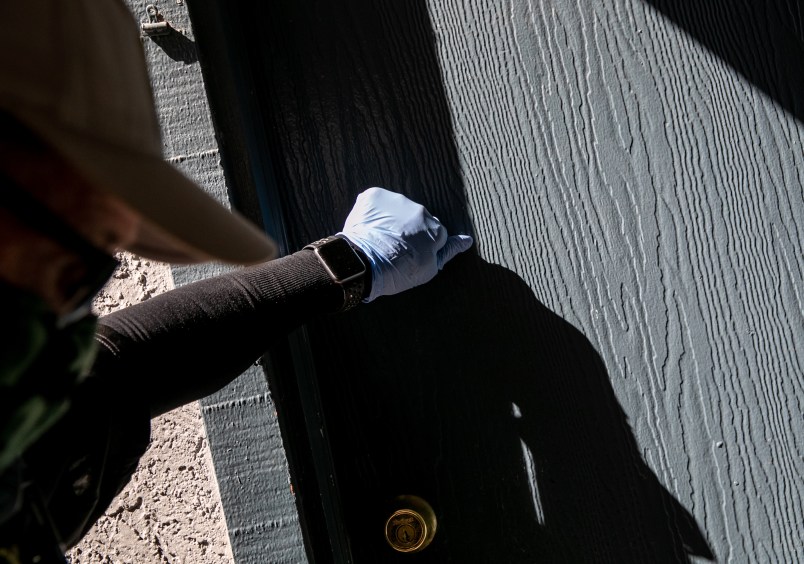It started on Friday when the Yavapai County sheriff’s office issued a statement warning that it had received reports of people posing as employees of the county recorder’s office allegedly knocking on doors of residents and asking who they voted for.
— Yavapai Recorder (@YavapaiRecorder) June 14, 2021
Yavapai County Recorder Leslie Hoffman’s office retweeted the alert on Monday and told TPM she felt compelled to notify the public about the door-knocking incidents after two county residents contacted the Prescott Police Department and the recorder’s office about the potential posers.
A resident in a gated retirement community was allegedly asked who she and others in the area voted for in the last election by the unidentified canvasser, and reported the incident to the Prescott Police Department and the Yavapai County Recorder’s office afterward.
According to Hoffman, a day or two after the first case was reported, another woman living in the county reported a similar incident to the county recorder’s office. But in this case, the resident was asked about different names of people and whether they lived at her home.
Both residents reported that the door-knockers claimed that they were conducting a survey about who residents voted for, but when the residents asked for the solicitors name and identification to prove they worked for the recorder’s office, the canvassers promptly left the scene, according to the county recorder.
Hoffman is unsure who is behind the door-knocking tactic, and told TPM there is currently no evidence that the effort is linked to the Maricopa County audit.
Hoffman stressed that she has an obligation to ensure that the recorder’s office is a trusted source of information, especially in a county with a significant amount of retired residents.
“A lot of our community is retired, and they get targeted for things. And I just wanted to make sure that our citizens know that any people coming to their door are not representing the county office,” Hoffman said. “We always try to be that trusted source for people who have any questions. And if someone is representing our office and they’re not, that could be a problem.”
Asked whether Yavapai County plans to contact the Justice Department’s Civil Rights Division about the incidents, Hoffman said she is waiting to see if similar cases occur before consulting the county’s legal counsel on any potential further action.
The alert in Yavapai County — which is adjacent to Maricopa County where the ongoing sketchy “audit” of the 2020 presidential election is taking place — comes a month after the Justice Department’s Civil Rights Division wrote in a letter that canvassing practices like this could potentially violate federal law.
Last month, the Arizona Senate said it would hold off on a controversial plan to knock on voters’ doors as part of a Republican-commissioned election recount in Maricopa County because that type of door-to-door interviewing raised concerns about voter intimidation. As part of the sketchy “audit,” Cyber Ninjas — the Florida-based firm contracted by the state Senate to conduct the recount — tried to introduce plans to “statistically identify voter registrations that did not make sense” and conduct interviews with voters by phone and “physical canvassing.”
“Such investigative efforts can have a significant intimidating effect on qualified voters that can deter them from seeking to vote in the future,” principal deputy assistant attorney general Pamela Karlan wrote in a letter to the state Senate in May raising concerns about the audit.
State Senate President Karen Fann (R) responded in a letter that the door-to-door canvassing would not go forward.
Similar efforts in the state to delegitimize the 2020 presidential results may not be restricted to Maricopa County.
Liz Harris, a Republican who ran an unsuccessful campaign for the state House last year, claimed that she has organized a group of canvassers to knock on doors to check voter registration data.
Harris, however, denied in a video posted Monday that anyone in the group that she is leading is behind the incidents in Yavapai County, and decried the county sheriff’s advisory about the canvassing as a tactic that could potentially “scare people” out of joining in on such efforts.







If only the Qtards could find some useful purpose for their sorry, conspiracy ridden lives.
Ain’t gonna happen.
State Senate President Karen Fann’s home is in Prescott, the largest town in AZ Legislative District 1.
Thugs.
Arizona gop’s getting desperate. This is what a tipping point looks like.
I am “not amused” by these Gestapo tactics on the part of the AZ GQP.
Fuck their “state sovereignty”. Bring on the DOJ.